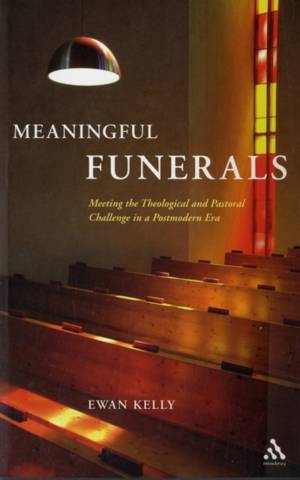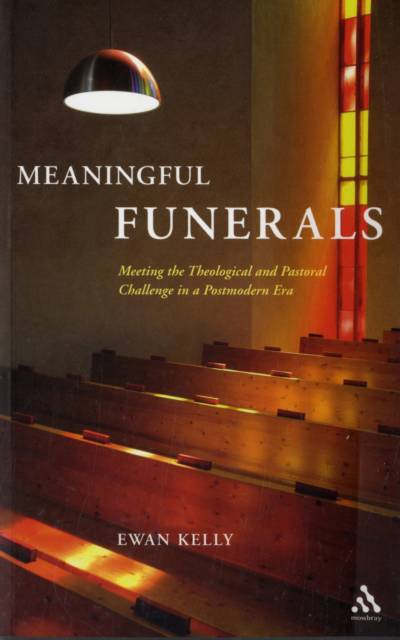
Bedankt voor het vertrouwen het afgelopen jaar! Om jou te bedanken bieden we GRATIS verzending (in België) aan op alles gedurende de hele maand januari.
- Afhalen na 1 uur in een winkel met voorraad
- In januari gratis thuislevering in België
- Ruim aanbod met 7 miljoen producten
Bedankt voor het vertrouwen het afgelopen jaar! Om jou te bedanken bieden we GRATIS verzending (in België) aan op alles gedurende de hele maand januari.
- Afhalen na 1 uur in een winkel met voorraad
- In januari gratis thuislevering in België
- Ruim aanbod met 7 miljoen producten
Zoeken
Meaningful Funerals
Meeting the Theological and Pastoral Challenge in a Postmodern Era
Ewan Kelly
Paperback | Engels
€ 72,95
+ 145 punten
Omschrijving
The majority of the British population no longer attend church and, consequently, lack familiarity with the Christian tradition, its stories, language and metaphors. However, when bereaved, many still turn to church representatives, working in parish settings or chaplaincies, to perform funerals for their loved ones. The key issue addressed in this book is how funerals may be created which are not only relevant for the bereaved, but also have theological integrity. A paradigm shift in the manner by which funerals are constructed is proposed - from imposing alien liturgies to creating a unique ritual which evolves from the meeting of the stories of the bereaved and that of the ritual leader.
The argument for the co-construction of funerals is informed by contemporary models of grief and Kelly's own experience with bereaved parents who worked with hospital chaplains to co-construct funerals for their babies. Co-construction is a process which is centred on listening and empowering, and involves offering the bereaved choices from a range of ritual resources (sacred and secular) in order to help them shape their funeral's content. It is a model of ritual construction which requires time, availability and risk-taking on the part of the ritual leader but which significantly helps the spiritual needs of the bereaved to be met. Moreover, such a process facilitates sensitive regulation of grief in an age where its privatisation has meant the bereaved are often bereft of a means by which to benchmark their feelings, behaviour and decision making.
The argument for the co-construction of funerals is informed by contemporary models of grief and Kelly's own experience with bereaved parents who worked with hospital chaplains to co-construct funerals for their babies. Co-construction is a process which is centred on listening and empowering, and involves offering the bereaved choices from a range of ritual resources (sacred and secular) in order to help them shape their funeral's content. It is a model of ritual construction which requires time, availability and risk-taking on the part of the ritual leader but which significantly helps the spiritual needs of the bereaved to be met. Moreover, such a process facilitates sensitive regulation of grief in an age where its privatisation has meant the bereaved are often bereft of a means by which to benchmark their feelings, behaviour and decision making.
Specificaties
Betrokkenen
- Auteur(s):
- Uitgeverij:
Inhoud
- Aantal bladzijden:
- 224
- Taal:
- Engels
Eigenschappen
- Productcode (EAN):
- 9781906286149
- Verschijningsdatum:
- 18/10/2008
- Uitvoering:
- Paperback
- Formaat:
- Trade paperback (VS)
- Afmetingen:
- 137 mm x 213 mm
- Gewicht:
- 294 g

Alleen bij Standaard Boekhandel
+ 145 punten op je klantenkaart van Standaard Boekhandel
Beoordelingen
We publiceren alleen reviews die voldoen aan de voorwaarden voor reviews. Bekijk onze voorwaarden voor reviews.









